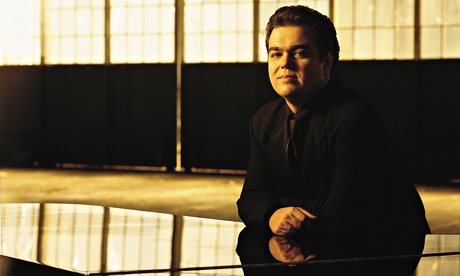
It can be hard to reconcile the two sides of Arcadi Volodos’s musical personality. On one hand he’s the virtuoso pianist who delights in making his audience’s heads spin, hurtling through his own crazily difficult transcriptions as encores. On the other, he often produces playing of such rapt quietness as to make the world stand still.
Time after time in this recital, pieces ended in just that way, with the final note seeming to have been pressed down not by Volodos’s finger alone but by a concerted force of will on the part of pianist and audience too.
That was the case at the end of Schubert’s Allegretto in C, D346, a tinkly music-box-type contemplation performed by Volodos in what many believe is its rightful place as the lost last movement of the early Sonata in C, D279. After an almost peremptory start, the performance was thoughtful, nuanced and mercurial. The romantic sweep of Brahms’s Six Pieces, Op 118 brought more fire and, in the closing piece, obsessive fervour; but the stillness was there in the central passage of the gorgeous second piece, inspiring new heat in what followed it.
If Schumann’s Kinderszenen found the poise of Volodos’s playing occasionally disrupted by some hurried, unfocused phrases, the same composer’s Fantasie in C was where, on this occasion, Volodos’s approach hit some limits. In the first movement he brought out that entrancing, whispering tone so many times that any sense of momentum was scuppered; each time the five-note theme associated with Schumann’s lover Clara Wieck climbed out of the underlying texture it sounded epic, but otherwise it felt as if the piece were constantly slowing down. The seamless flow of the final movement did much to redeem things, though – as did the four encores, which took in a dreamy account of Schumann’s Vogel als Prophet and Volodos’s own splashy transcription of Falla’s Spanish Dance from La Vida Breve, a lesson in freewheeling virtuosity.

